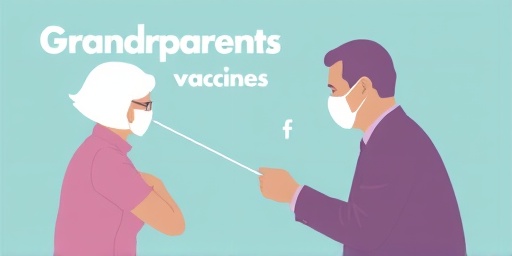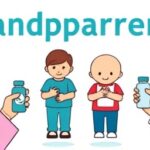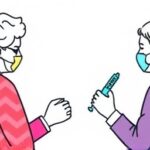In a bold move to tackle vaccine hesitancy gripping southern Illinois communities, the Southern Seven Health Department has officially launched the ‘Grandparents for Vaccines‘ initiative. This innovative campaign harnesses the trusted voices of older adults to dispel misinformation and drive up immunization rates among families, addressing a critical gap in public health.
- Grandparents’ Trusted Role Takes Center Stage in Vaccine Advocacy
- Campaign Toolkit Unveiled: From Workshops to Digital Resources
- Local Health Leaders Rally Behind Initiative’s Anti-Misinformation Push
- Southern Illinois Immunization Gaps Spotlight Urgent Need for Change
- Measuring Success and Scaling Up: Path Forward for Regional Health
The announcement came during a press event in Marion, Illinois, where department director Dr. Elena Ramirez emphasized the urgency: “Grandparents hold immense sway in family decisions on Vaccines. By empowering them with facts, we’re bridging generational divides in community outreach and safeguarding our most vulnerable.” Local immunization rates have dipped to 72% for childhood Vaccines in the seven-county region—below the national 90% target—fueled by online myths and pandemic-era doubts.
Grandparents’ Trusted Role Takes Center Stage in Vaccine Advocacy
At the heart of the ‘Grandparents for Vaccines’ campaign is a strategic pivot toward intergenerational influence. Studies from the CDC show that 68% of parents consult grandparents before vaccinating children, making seniors pivotal in overcoming hesitancy. Southern Seven, serving Alexander, Johnson, Massac, Pulaski, Pope, Saline, and Union counties, recognized this dynamic early.
“We’ve seen firsthand how a grandmother’s story can sway a hesitant parent,” said Ramirez. The initiative trains grandparents through free workshops, equipping them with toolkits featuring infographics, FAQs, and personal testimonial scripts. Early pilots in Saline County yielded a 15% uptick in walk-in vaccinations at local clinics.
This approach counters misinformation head-on. A recent survey by the department revealed 42% of regional adults encountered false claims about vaccine safety on social media, including debunked links to autism or infertility. By positioning grandparents as relatable ambassadors, the campaign fosters authentic community outreach, far beyond traditional PSAs.
Participating grandparents like 74-year-old Marion resident Betty Hargrove are already mobilizing. “My grandkids were skipping shots due to TikTok nonsense. Now, I’m armed with real science to share,” she shared at the launch. Hargrove’s involvement highlights the personal stakes in public health restoration.
Campaign Toolkit Unveiled: From Workshops to Digital Resources
The ‘Grandparents for Vaccines’ rollout includes a multifaceted arsenal designed for maximum impact. Core components feature monthly in-person workshops at 12 community centers across the seven counties, starting with a kickoff event on October 15 in Cairo. These sessions, limited to 25 participants, cover vaccine science, myth-busting, and conversation starters.
Digital tools amplify reach: a dedicated website (grandparentsforvaccines.org) offers downloadable PDFs, videos narrated by local elders, and a chatbot for quick queries. “We’re meeting people where they are—Facebook groups and church bulletins,” explained outreach coordinator Jamal Thompson. Print materials, including bilingual flyers in English and Spanish, target rural pockets with lower immunization rates.
Partnerships bolster the effort. Collaborations with AARP Illinois chapters provide venues, while pharmacies like Walgreens offer on-site vaccination drives tied to workshop dates. Funding from a $250,000 state public health grant ensures sustainability through 2025.
- Workshop Schedule: Cairo (Oct 15), Vienna (Oct 22), Harrisburg (Nov 5)
- Digital Metrics Goal: 10,000 website visits in first quarter
- Target Demographic: Adults 65+, with 500 trained by year-end
Early feedback is promising. In a test group of 50 grandparents, 92% reported increased confidence discussing vaccines, per post-session surveys.
Local Health Leaders Rally Behind Initiative’s Anti-Misinformation Push
Endorsements from regional stakeholders underscore the campaign’s timeliness. Dr. Marcus Hale, pediatrician at Union County Hospital, called it “a game-changer for community outreach.” He cited a 20% rise in whooping cough cases last year, linking it directly to vaccine gaps exacerbated by misinformation.
Southern Seven’s initiative aligns with national trends. The WHO reports global vaccine confidence at its lowest in decades, with U.S. hesitancy rates climbing 12% since 2019. Locally, the department’s data shows rural counties lagging urban ones by 18 points in flu shot uptake.
“This isn’t just about shots—it’s about rebuilding trust in science through family bonds.” — State Rep. Natalie Tassie, sponsor of related legislation
Community figures like Pastor Elena Ruiz of Harrisburg’s First Baptist Church are integrating sessions into Sunday schools, blending faith and facts. “Our elders are our wisdom keepers; they’re perfect for this,” she noted.
The department’s history bolsters credibility. Since 1961, Southern Seven has managed outbreaks from measles to COVID-19, vaccinating over 50,000 residents during the pandemic. This track record positions ‘Grandparents for Vaccines’ as a natural evolution in their public health arsenal.
Southern Illinois Immunization Gaps Spotlight Urgent Need for Change
Immunization shortfalls in southern Illinois paint a stark picture. CDC data indicates the region’s kindergarten vaccination rate at 68.5%, versus 93% statewide. Factors include economic barriers, limited clinic access, and rampant misinformation via platforms like YouTube and WhatsApp groups.
Pulaski County’s rate hovers at 65%, hit hardest by job losses and isolation. “Distance to clinics deters many, but family persuasion can bridge that,” said epidemiologist Lena Torres. The initiative includes mobile vaccine units synced with grandparent events, aiming to close this gap.
Broader context reveals stakes: unvaccinated clusters fuel outbreaks. Last winter’s flu season hospitalized 1,200 in the region, 30% avoidable with better coverage. Nationally, vaccines prevent 6 million deaths yearly, per WHO—stats Southern Seven leverages in its messaging.
Experts like University of Illinois public health professor Dr. Raj Patel praise the peer-to-peer model: “Top-down fails; bottom-up via trusted kin succeeds.” Patel’s research shows family endorsements boost compliance by 25%.
Measuring Success and Scaling Up: Path Forward for Regional Health
Success metrics for ‘Grandparents for Vaccines’ are rigorous. Southern Seven tracks vaccination appointments pre- and post-workshops, targeting a 10% regional immunization lift by mid-2025. Digital analytics monitor engagement, while follow-up surveys gauge behavior change.
Expansion plans include virtual sessions for homebound seniors and school partnerships for teen boosters. If pilots succeed, the model could go statewide, with Ramirez eyeing national replication via CDC channels.
Long-term, the initiative fortifies public health resilience against future threats like mpox or novel flu strains. “By empowering grandparents today, we’re protecting grandchildren tomorrow,” Ramirez concluded. Community buy-in is key, with calls for volunteers flooding in post-launch.
As winter approaches—a peak for respiratory illnesses—the campaign’s momentum builds. Residents can sign up at southernsseven.org/vaccines or call 618-997-8730. In an era of doubt, Southern Seven’s bet on grandparents signals hope for healthier communities ahead.








